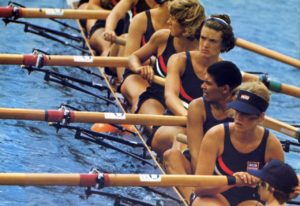Excerpted from Boathouse Row, Waves of Change in the Birthplace of American Rowing by Dotty Brown (Temple University Press)

The 1976 women’s eight, which won the bronze medal. It was coached by Harvard coach Harry Parker. Photo: 1976 US Olympic Book
Anita DeFrantz returned to Philadelphia, the city of her birth, in 1974, a year after Title IX went into effect. The full force of this landmark legislation, which mandated gender parity in schools that received federal funding, was yet to reveal itself. At Vesper, Anita said, “I was shocked at how small the size of the locker room was.” And she was disappointed that the women in training did not have the extra resources available to the men.
The men training at Vesper “had a place to live – in the boathouse; the women had to pay rent. Work was available to the men; it was much harder for the women to get support. Also, it was harder for women to get time off from work.”
But at least the men were beginning to accept their presence on the dock.
Anita trained three times a day while attending law school, and working nights at the Philadelphia police headquarters interviewing defendants before bail hearings. It was a grueling routine, requiring an extraordinary level of desire and commitment. But it began to pay off.
In 1975, Anita made the national team that went to the world championships in England, coming in fifth in a four-oared shell. But it was the American women’s crew, with women from Yale, MIT, Princeton and elsewhere, coached by Harvard’s Harry Parker, that stunned the rowing world. The “Red Rose Crew,” named for the roses the women wore in their rowing shoes, won silver, dispelling any doubts that American women could be contenders in their first Olympics.
At Yale, Chris Ernst, a member of the Red Rose Crew, was also trying to train, but was doing so under conditions that Title IX was supposed to remedy. The Yale women suffered with inferior boats and equipment to the men, no locker room at the boathouse, and makeshift showers that had no hot water. Their worst indignity was having to sit on the bus, shivering in their sweaty clothes, waiting for the men to shower and change before riding back to campus.
On March 3, 1976, nineteen women bared their torsos, on which they had penned “Title IX” with blue markers, and marched into the women’s athletics office at Yale. They read this statement:
These are the bodies Yale is exploiting. We have come here today to make clear how unprotected we are, to show graphically what we are being exposed to … On a day like today, the rain freezes on our skin. Then we sit on a bus for half an hour as the ice melts into our sweats to meet the sweat that has soaked our clothes underneath … We’re human and being treated as less than such.
Yale’s administration immediately got the women portable showers and quickly added a women’s wing to the riverfront locker room, as colleges around the country took note.
Boathouse Row, Waves of Change in the Birthplace of American Rowing by Dotty Brown is the first book to lift the curtain on the little-known culture and history of Philadelphia’s iconic 19th century landmark, revealing stories of passion and perseverance along with hard-won victory. With more than 160 photographs, Boathouse Row chronicles the “waves of change” as people of different races, classes, and genders fought for access to water and the sport. Learn more at https://boathouserowthebook.com/ and follow at @BoathouseRowBook
